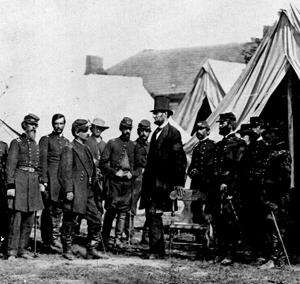The Many Myths of the Civil War

Some 150 years after the Civil War erupted, the topic remains a charged topic even if the issues Americans fought over are long gone. Bruce Levine, professor of history and African American studies, says myths regarding the war and its causes persist even today.
Myth 1: The Civil War had little to do with slavery.
Not true, says Levine, who has written several books on the Civil War era. While many assert that the South wanted to secede to protect states’ rights, tariffs, and other matters, Levine says, the historical record of North-South disputes during the 40 years prior to the conflict “shows unmistakably that slavery was central to it.”
“The leaders of the secession movement said as much in 1860-61,” Levine contends. “They left the Union because they believed that Lincoln’s election imperiled the security of slavery, an institution that they considered essential to their own happiness and prosperity.”
Myths 2, 3, and 4: Lincoln fought only to save the Union; Lincoln fought only to free the slaves; Lincoln didn’t care about the slaves.
Lincoln’s reasons for going to war against the seceding states are multifaceted, Levine says. He wanted to preserve the Union, but secession occurred, Levine says, because of Lincoln’s and the Republicans’ stand against slavery.
Lincoln detested slavery, Levine adds, but prior to the war he did not believe the Constitution allowed him to interfere with the practice. During the 1850s Lincoln helped create the Republican Party to help prevent slavery from spreading further within the country, and the 16th president hoped that by confining it to states where it already existed, slavery would eventually fade away.
“Let’s also remember that if Lincoln had been willing to preserve the Union at all costs, he could have done so,” Levine says. “Many called upon him in 1860-61 to avoid or reverse secession by backing down on the subject of slavery’s expansion. He steadfastly refused to do that, and his party backed him up.”
Myth 5: Southerners were united in their opposition of the North.
About a third of white families in the South owned slaves. Many non-slaveholders valued the practice because it benefited them indirectly, Levine says, and many of them also believed in white supremacy. This doesn’t mean the South was united against the North, however, even as Northern troops invaded.
“From the very outset, some non-slaveholding white southerners—especially in the hills and mountains and some other districts—opposed secession,” Levine says. “Thousands joined Union army regiments. The western counties of Virginia refused to participate in secession.... Here was the origin of the modern state of West Virginia. Other people tried unsuccessfully to do the same thing in eastern Tennessee.”
Myth 6: Northerners fought chiefly to abolish slavery.
“Only a rather small minority of northerners went to war for the purpose of abolishing slavery,” Levine says. “Most fought first and foremost to preserve the Union.”
That’s not the end of the story, he adds.
“More than half of all voters in the free states had cast their votes for Lincoln and his party in 1860,” Levine says. “They, too, wanted to defend the Union—but like Lincoln himself they also wanted to see that Union eventually rid itself of slavery.”





